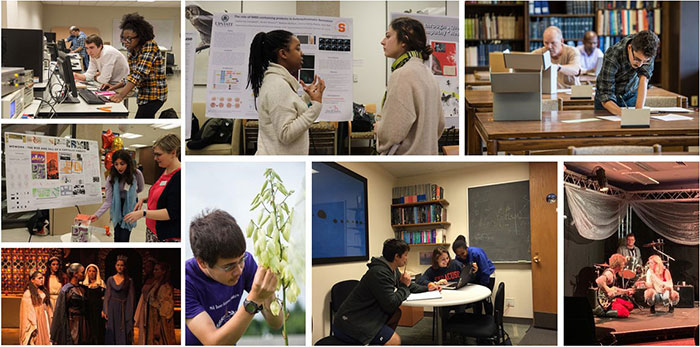SOURCE Summer Research Symposium
The SOURCE Summer Research Symposium will showcase outstanding undergraduate presentations of in-depth research, scholarly and creative work. The campus community is invited to attend and celebrate the exciting research and discovery of undergraduate students participating in summer research programs at SU, ESF and SUNY Upstate!
Thursday, Aug. 8
10 a.m.– noon
Poster session in the Panasci Lounge (Schine Student Center) followed by a picnic at the Huntington Beard Crouse Patio.
Please join us for our events – calendar is here
Doing Research This Summer?
If you’re an SU undergraduate student participating in research this summer, either on- or off-campus, or at another institution, please let us know!
Complete the SOURCE Summer Research Survey
Join us for summer workshops, events, and outings with the undergraduate research community: SOURCE Summer 2024 Schedule
Our mission is to foster and support diverse undergraduate participation in faculty-guided scholarly research and creative inquiry. Student participants progress through initial training in research or other creative skills, to designing and revising the structure of their projects, and culminating in research, creative and professional contributions that are original and timely.
Connect With Us
- Register for our biweekly newsletter
- Email ugresearch@syr.edu
- Call 315.443.2091. Leave us a voicemail and we’ll return your call.
- Stop by 208 Bowne Hall
Undergraduate Research FAQs
What is research and creative engagement?
Undergraduate research work takes many forms but all follow a similar structure:
- Beginning with a sense of curiosity in the exploration of a topic of interest
- An understanding of the current landscape of a scholarly, professional or creative field of study.
- Designing of a study or project using the methods and tools of a discpline to present evidence that responds to a question or theme.
- All undergraduate research students are supported by a faculty mentor in their field.
- Student research and creative projects may be produced by students at all levels in classes, labs, recitals, as part of a distinction or thesis program, or independently.
Why should I participate in undergraduate research?
Participating in undergraduate research allows you to:
- Apply your knowledge to real-world problems and issues
- Develop a strong faculty mentor relationship
- Improve your problem-solving and creative thinking skills
- Explore potential career areas
- Develop skills you can use on the job market or in grad school
- Explore a topic you find fascinating and participate in the creation of new knowledge
How does undergraduate reserach work at Syracuse University?
- Students are guided by a faculty mentor (typically a tenured or tenure-track professor) or research staff member.
- In humanities, communications/journalism, business/management, social sciences, arts: students work as part of a research team or one-on-one with a professor to either assist with an ongoing project or design an independent project.
- In STEM fields: students work as part of a lab team, led by a professor (or Primary Investigator, “PI”): students assist with ongoing projects and may take leadership on part of the lab’s work.
- Students may also work off-campus, with a community organization, another university, or do research as part of the study abroad experience.
What are some examples of undergraduate research?
- Miguel Guzman, ’24 – lab research on bioactive protein-cholesterol-based nanoparticles
- Sophie Clinton, ’24 – conducted social science research while abroad in Santiago, Chile
- Ngai Lan Tam ’23 – created an exhibition with structural design, film and performance
- Fátima Bings Martínez ’24 – worked as a research assistant for a literary journal
- Ruchatneet Printup ’23 – directed a film set in his Native community
How do I find a research topic or area of interest?
Jot down a few notes in response to these prompts:
- Readings or lectures from a class that sparked your interest and made you want to learn more or share with a friend
- Problems or issues that you’d like to contribute to solving or improving
- Gaps in your education
- Skills that you’re interested in developing
- Passions, hobbies, and personal interests
- Goals or outcomes that could build your portfolio and be shared with a future employer or graduate school
Connect with others
- Talk to your professors during their office hours about how they first discovered their research interests
- Get inspired at a student research presentation event on campus: the SOURCE Fall Expo, Spring Showcase, or Summer Symposium, or a school/college event
- Go to lectures and talks on campus and ask questions
- Chat with fellow students doing research (you could start with SOURCE Student Research Mentors) about how they found their focus
- If you have a specific post-graduate goal (career, graduate study, etc.), speak with career and academic advisors about the skills you should be building

